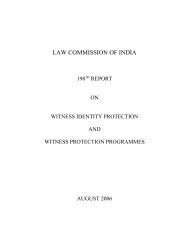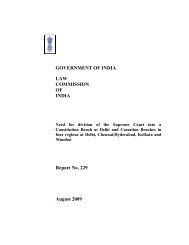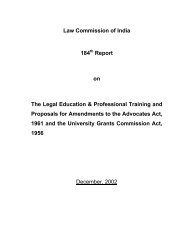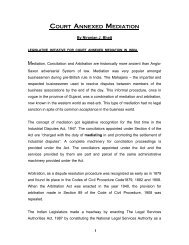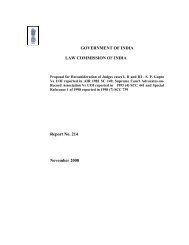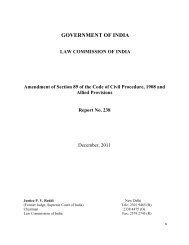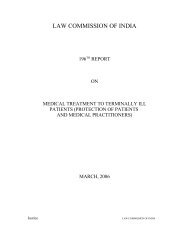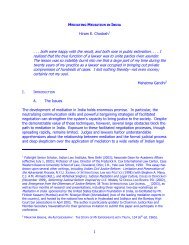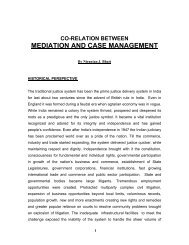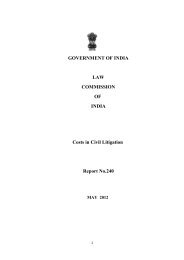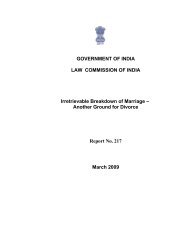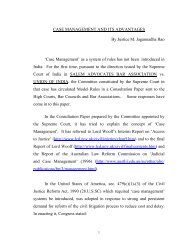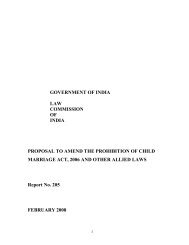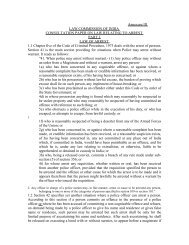case management and adr for banking sector - Law Commission of ...
case management and adr for banking sector - Law Commission of ...
case management and adr for banking sector - Law Commission of ...
Create successful ePaper yourself
Turn your PDF publications into a flip-book with our unique Google optimized e-Paper software.
The recent decision <strong>of</strong> the Hon’ble Supreme Court reported in AIR 2001 SC 509 16 (basedon which recently Bar Council <strong>of</strong> India has passed resolution deleting the proviso to Rule49) is distinguishable on facts in as much the <strong>Law</strong> Officer in that <strong>case</strong> was not anAdvocate who later became <strong>Law</strong> Officer but a person in full time employment who latergot enrolled as Advocate on the recommendations <strong>of</strong> his Institution <strong>and</strong> there<strong>for</strong>e, hisvery enrollment is against Rule 49.Hon’ble Bombay High Court in a <strong>case</strong> reported in AIR 1982 Bom 6 17 , while analyzingthe role <strong>of</strong> <strong>Law</strong> Officers in Public Sector Undertakings (in the said <strong>case</strong> being MunicipalCorporation) has held as follows:“<strong>Law</strong> Officers are regarded by law as in every respect in the same position as those whopractice on their own account. The only difference is that they act <strong>for</strong> one client only, not<strong>for</strong> several clients. They must uphold the same st<strong>and</strong>ards <strong>of</strong> honour <strong>and</strong> etiquette. Theyare subject to the same duties to their client <strong>and</strong> to the Court. They must respect the sameconfidence. They <strong>and</strong> their clients have the same privileges. The relationship between a<strong>Law</strong> Officer <strong>and</strong> the Institution concerned is that <strong>of</strong> a client <strong>and</strong> his legal advisor.”Further, in Duncan Agro’s <strong>case</strong>, the Hon’ble Supreme Court has held that the legalopinion <strong>of</strong> a <strong>Law</strong> Officer cannot be faulted with unless the opinion is per se malafide.Considering the aspects discussed under 5.3.3 <strong>and</strong> 5.3.3.1, it can be discerned that thougha <strong>Law</strong> Officer (ie., an advocate who later become <strong>Law</strong> Officer) is on the permanent payrolls <strong>of</strong> the a<strong>for</strong>esaid institutions, they remain as Advocate not being subjected to thedisciplinary control at least regarding their pr<strong>of</strong>essional conduct. Thus, their impartialityis preserved legally. New Section 10A sought to be introduced under the Arbitration <strong>and</strong>Conciliation (Amendment) Bill, 2001 is in tune with this spirit.5.3.4 EXPEDITIOUS DISPOSALThe a<strong>for</strong>esaid suggestion to utilize the services <strong>of</strong> <strong>Law</strong> Officers (in-house) has been madewith the primary view to increase the pace <strong>of</strong> arbitration, being compulsorily 6 months<strong>for</strong> final disposal from the date when the matter has been referred to the Arbitrator. Thistime-stipulation has to be taken care by stipulating appropriate provision in the rules withcategorical time schedule <strong>for</strong> each stage. The <strong>Law</strong> Officers working as in-house legalcounsels will devote their full time <strong>for</strong> conducting arbitration thereby paving way <strong>for</strong>speedy disposal <strong>of</strong> <strong>case</strong>s. In Course <strong>of</strong> time, they will gain much pr<strong>of</strong>iciency therebyfurther increasing the momentum.5.3.5 FLEXIBILITY16 Sathish Kumar Sharma, Appellant v. Bar Council <strong>of</strong> Himachal Pradesh, Respondent, reported in AIR2001 SC 509.17 Municipal Corporation <strong>of</strong> Greater Bombay v. Vijay Metal Works reported in AIR 1982 Bom.6



